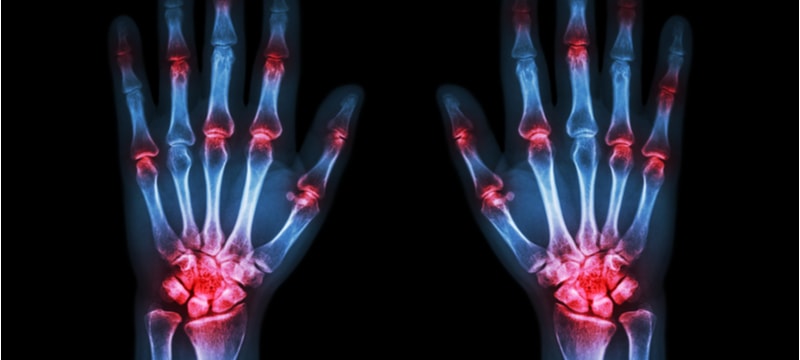
While medical cannabis remains a contentious subject in the UK as patients struggle to get access, the results of a new survey show just how much cannabis has been embraced by people suffering from arthritis and joint pain. The survey of over 1,000 people was conducted by Creaky Joints, an online arthritis support community that is affiliated with the Global Healthy Living Foundation.
The results, which were presented at the 2019 Annual European Congress of Rheumatology meeting in Madrid, showed that 57% of respondents had tried either CBD or cannabis to treat their joint pain.
While pop culture would have you believe that the average cannabis user is a lazy, 20-something male, the Creaky Joints survey showed that among their community base, cannabis users were overwhelmingly female with an average age of 57. Most patients who took part in the survey either suffered from rheumatoid arthritis (46%) or osteoarthritis (22%), among other conditions such as fibromyalgia and ankylosing spondylitis. Medical cannabis and CBD were also used to treat the variety of healthcare concerns that come with joint problems, such as insomnia, fatigue, physical function, pain, and depression.

Of those who had used CBD and/or cannabis to treat their joint pain, an overwhelming majority reported that it had helped to improve their symptoms. 97% of people who had tried cannabis said it had helped, while 93% of CBD users said it improved their joint pain. Among those using medical cannabis, 62% reported using it at least once a day.
Combining CBD, cannabis and traditional treatment
45% of respondents stated that despite already taking medication, they had resorted to using cannabis or CBD to treat arthritis symptoms on top of their traditional treatment. While the survey showed that the vast majority of cannabis and CBD users found significant relief, opening up the doctor-patient discussion around CBD and cannabis use remains a considerable problem.
Making changes to any medical treatment should always be discussed with healthcare providers first, however, only two-thirds of patients reported disclosing their CBD or cannabis use to their medical providers. The survey did not state why respondents felt uncomfortable discussing their cannabis/CBD use with their doctor, however, stigma and concerns around legality are often the biggest factors. In fact, 31% of the survey’s respondents were forced to stop their cannabis use because it was illegal where they lived.
Of those that did disclose to their healthcare provider, 58% of respondents said that their doctor did not give them any advice on the safety, effectiveness or dosing of CBD and/or cannabis, nor did they consider their cannabis/CBD use when making treatment changes. With this in mind, 54% of people wanted to be able to access more information on CBD and cannabis use from their doctor.

Although the data from the Creaky Joints survey is entirely anecdotal, there is considerable scientific evidence to support the use of CBD and cannabis for treating joint pain. Research shows that CBD and other cannabinoids can work as a powerful anti-inflammatory for a variety of conditions, while a 2019 review of research published in Current Opinion in Rheumatology showed that cannabis could significantly improve rheumatoid arthritis.
While there is considerable research around medical cannabis and inflammatory conditions, medical cannabis treatment in the UK is currently mostly limited to treating rare forms of epilepsy and nausea from chemotherapy. However, reports from patients show that CBD and medical cannabis treatment remains largely unavailable to the people who need it most, despite the fact that it was legalised in 2018.
Source: The Extract.
 Based on +200
reviews
Based on +200
reviews
